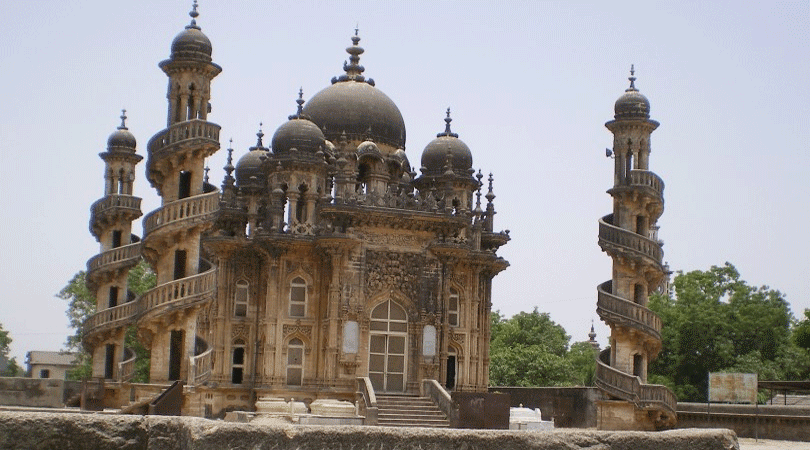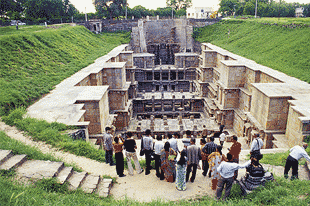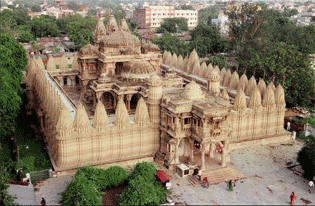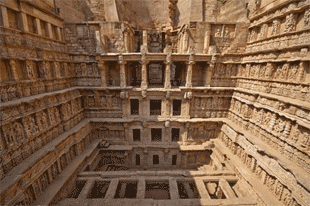Ahmedabad, India
Situated at the banks of Sabarmati River, Ahmadabad is the commercial capital of Gujarat that earlier was known as Manchester of India or Manchester of East. Famous for its unique culture and various festivals, it is a busy and developed city with rapidly growing textile industry. The city is the nerve of the all the cultural activities of Gujarat and also famous for its antique folk art.
The city is a home to various splendid monuments, ancient mosques, majestic forts, pavilions and mausoleums that have been designed by world famous architects. Along with this, the city is also a hub for the major educational and learning centers producing some of the world class professionals. The 6th largest city of India features various historical and interesting places that can be visited during your stay at Ahmadabad.
Ahmedabad was founded by Sultan Ahmed Shah I in 1411 AD on the banks of Sabarmarti River. He made this city his capital after seeking a hare running behind a dog and then realized if a rabbit of this city can be so brave, then how brave people of the city will be. He constructed here a number of splendid monuments, mosques, pavilions and mausoleums. The Indo-Saracenic style of architecture was implemented in different monuments of the city. It has been the land from where Gandhi fought the battle of freedom. At present, Ahmedabad is a busy destination enjoying a flourishing textile industry.
Visit in Ahmedabad
Ahmedabad is the commercial hub of Gujarat and the 6th largest city in India enjoying a flourishing trade sector. There are a number of places to visit in Ahmedabad. Owing to its wide variety of tourist attractions, the city turns into a popular sightseeing place of India. From lakes to museums, from historical monuments to religious places, the city offers places of great historical importance. Explore the bellow article to know about the best places to visit in Ahmedabad.
It is one of the excellent museums of India that has rare collections of textiles of 17th century. It deals with the historical and technical study of Indian handicraft and textile industry and appeals the tourists from all over the world. Every year, a number of researchers and scholars visit this place for understanding each aspect of this industry. You can see variety of handicrafts, temple relics and marble, bronze & sandstone icons.
Constructed using yellow sandstone, Jumma Masjid is an excellent blend of Hindu and Muslim styles of architecture in the heart of the old city. It is one of the most beautiful mosques of the east that took almost 13 years to be completely constructed. This stunning construction is a masterpiece of the architectural elegance of Ahmadabad. The mosque features a white marble courtyard, pool in center and huge archway in the front. Built in year 1424 during the rule of Ahmed Shah I, the mosque is positioned outside Bhadra Fort area and features architecture of yellow sandstone. The mosque complex is centrally located over a large rectangular courtyard of an area of 75/66 meters.
Built by Sultan Mehmud Beghara on the name of his Hindu wife Rani Roopmati, this mosque is a superb blend of Indo-Saracenic style and an example of the excellent craftsmanship of the region. This mosque has three domes that are supported by pillars, which are connected to each other by a flat roof. The mosque is also known as Masjid-e-Nagina and features high central arch, slim minarets, skillfully carved galleries and a delicate Mehrab.
Situated on the banks of Sabarmati River, this ashram has a historical significance due to its deep connection with Mahatma Gandhi. From this place, Gandhi started his Dandi March. It also affords a museum that has a collection of Mahatma Gandhi’s photographs, memorabilia and other valuable things. It also has a library and a memorial center. Visitors can enjoy here sound and light show.
It is one of the most significant attractions of the city that is situated in the Moti Shahi Mahal in the premises of Shahibag. It features a museum and an exhibition center. The building of the museum is encircled by Sardar Open Garden, where peacocks and monkeys can be seen easily roaming here and there. The museum also features an open air theatre, where documentary films are shown.
It is a triple arched gateway and an architectural masterpiece that was built by Sultan Ahmed Shah. This is located in fort complex that is surrounded by the most prosperous shopping zones of Ahmadabad. Rich in architectural grandeur, the architecture is a fine example of versatile craftsmanship
Kankaria Lake is the largest lake in Ahmedabad city. Situated in the southern part of the city, the lake has been enriched with several public attractions like zoo, toy train, food stalls, and entertainment facilities.
It is an important attraction of Gujarat state. The mosque features two minarets and each of which is 3-stories tall and have carved balconies. The minarets of the mosque are called as Jhulta Minar or Shaking Minarets.
Rani no Hajiro is mainly recognized as Mughalai Bibi's Tomb. It is the tombs of Ahmed Shah's Queens. The tomb features a huge gateway and its courtyard is surrounded by a framework of cloister. The courtyard features 8 marble tombs of the queens of Ahmed Shah I and other rulers of the region.
It is a museum in Ahmedabad, which was designed by the architect Le Corbusier. The museum portrays art, culture, history and architecture of Ahmedabad. There is another museum in its premises called as Patang Kite Museum. It displays a selection of kites, photographs, and other artifacts. The museum features the tallest incense stick of the world of 4.5 meters in length.
It is a garden themed amusement ground in the heart of the Kankaria Lake. Nagina Wadi is accessible through a straight, concrete and tree-lined walkway. One can enjoy here several several water sports activities.
testSpread over an area of 43 acres, the fort is one of the most majestic monuments of the city constructed by Sultan Ahmed Shah. The majestic fort features a number of splendid buildings, along with the extensive Nagina Baugh. It also includes an in-house temple that is dedicated to Goddess Kali. Bhadra Fort is a perfect place to explore a number of historical structures.
Ahmedabad, India

March to Mid-June, Hot and Dry
Temperature:28°C – 45°C

July to September
Annual rainfall -93.2 cm

Last November to February, Cool and Pleasant
Temperature:15°C – 28°C
Sights of Ahmedabad



